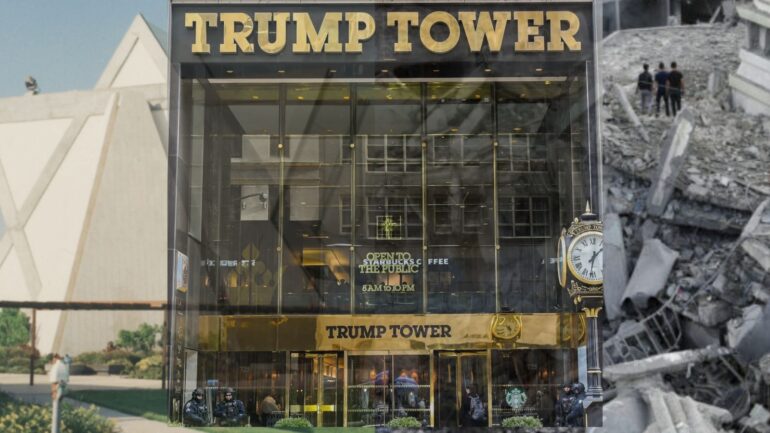Across the Jewish political spectrum in both Israel and the Diaspora, observers were stunned last week when US President Donald Trump announced his plans to evacuate all residents of Gaza in order to rebuild the strip as the “French Riviera of the Middle East.”
From the Palestinian solidarity activists, who are appalled at the explicit calls by the leader of the most powerful country on earth for the ethnic cleansing of Palestinians, to Israel’s national-religious community that firmly believes that the whole land from the river to the sea belongs to the Jews, and sees new hope for restoring Jewish sovereignty in Gaza as a result of this war, everyone was truly shocked by Trump’s bombastic statement.
But some historical context may reshape the way Jews of all political camps respond to the surprising development.
In 2004, as Prime Minister Ariel Sharon was gearing up to forcibly evict all Israeli civilians and withdraw Israeli troops from Gaza, he received some guarantees from US President George W. Bush on Israeli security in the form of a letter dated April 14. In the letter, the president assured Sharon that “the United States will do its utmost” to ensure that the Palestinians would cease all armed activity and violence, end all incitement, operate to root out terror, and establish a strong parliamentary democracy.
While Sharon accepted these commitments at face value, and saw them as sufficient to move forward with Bush’s directives, professional diplomats with a more sober understanding of the US-Israel relationship were more skeptical.
Clinton administration Ambassador to Israel Martin Indyk penned an op-ed eleven days later laying out the practical implications of Bush’s commitment. He noted that, in the absence of Palestinian institutions to actually carry through on Bush’s commitments, “If hooded Hamas terrorists end up dancing on the rooftops of Gaza settlements or indoctrinating Palestinian children in the former classrooms of Israeli settlers, Bush will be fielding the questions instead of Sharon,” and that ultimately, “the United States will end up inheriting the problems of Gaza.”
On more practical matters, Indyk noted that the likely consequences of Bush’s statement led NSC officials to begin intense negotiations with their Israeli counterparts and for Bush to delay the Gaza disengagement until after the US elections in November of that year. Ultimately, the former ambassador wrote that regardless of such arrangements, the most likely outcome is that Washington will need to put boots on the ground to lead an international peacekeeping force in order to oversee the transition and development of Palestinian institutions, which would necessarily empower Hamas as a legitimate player in Gaza politics.
So what happened?
Where were the Americans as Hamas won the Palestinian elections in 2006, refused to commit to Bush’s roadmap, and captured Israeli soldier Gilad Shalit?
Where were the Americans when Fatah-Hamas negotiations for power sharing in Gaza broke out into armed conflict in 2007, which rapidly ended with Hamas in full control of the strip and regularly launching rockets at Israel?
The answer is simple – as a second-term president bogged down with wars in Iraq and Afghanistan, Bush saw that the costs of US troops in Gaza were far greater than the benefits. He understood that even were an American intervention to succeed, his successor would get the credit, since it would take far longer than he had left in office. On the other hand, if it failed, historians would be quick to blame him for dragging the empire into yet another costly war in West Asia.
President Barack Obama’s calculus was the same. With his vision for a new US approach to the Semitic region, intervention in Gaza was the exact opposite of the “hands off” strategy he promoted during his initial visits to Turkey and Egypt. It was far easier for him to back out of Bush’s commitments to Sharon with Sharon in a coma and the Israeli public weary to launch a ground invasion due to the disaster of the Second Lebanon War than it would have been for him to justify putting American boots on the ground in Gaza to his war-weary public and to his prospective partners across the Islamic world.
So what’s changed? Why does Trump seem so confident that he can transform Gaza from a war-ravaged terror state into a beachfront paradise for vacationers and investors alike?
First and foremost, he’s watched Israeli operations in the strip for the last year and a half. He’s been impressed by Israel’s successes, and also taken notes from where the IDF has gotten bogged down. Now that Hamas’s military infrastructure has been significantly degraded, he believes that US troops with their top-notch gear and training can make short work of dismantling what remains.
Additionally, by convincing other countries to take in displaced Gazan Palestinians, he removes the constant cycle of local militants recruiting, rearming, and repositioning that has made it difficult for the IDF to work around the civilian population while minimizing harm to non-combatants. Trump is convinced that this combination will make the military side of the operation a quick win for Uncle Sam.
Next is the economic interest.
Already during his first weeks in office, Trump has made clear that he perceives economic power as a powerful diplomatic weapon. By committing to turn Gaza into a Mediterranean riviera, he expects to have no trouble funding the reconstruction project, not just through government aid from across the world, but also through private investors looking to profit off of Trump’s newest venture in real estate, hospitality, and retail. Such an economic success is a double win for Trump – Washington receives a major diplomatic boost that strengthens the American position in West Asia while Trump’s businesses get recognized not just for their economic strength, but also for their humanitarian and diplomatic value.
But what does that all mean for Gaza’s future?
If the military operation and the expulsion of Gaza’s residents doesn’t pan out as expected for Trump, will the US keep pouring money and troops into another West Asian morass?
Don’t count on it.
But the alternative could be even more dangerous.
If Trump’s scheme does work, if the Americans succeed at clearing out the Gaza population and rebuilding the wrecked landscape into a high end resort complex, will Palestinians be permitted to return and reclaim their homes after the value has skyrocketed?
Don’t count on it.
And once Gaza has been pacified, will the Jews expelled from their homes in Gush Katif due to Bush’s demands and empty promises be allowed to go home and rebuild their communities?
Don’t count on it.
As always, the US government is pursuing one objective and one objective alone – US imperial interests. And wherever those clash with the interests of Palestinians, Israelis, or both, expect nothing short of a diplomatic and economic blitzkrieg until Trump gets exactly what he wants.





